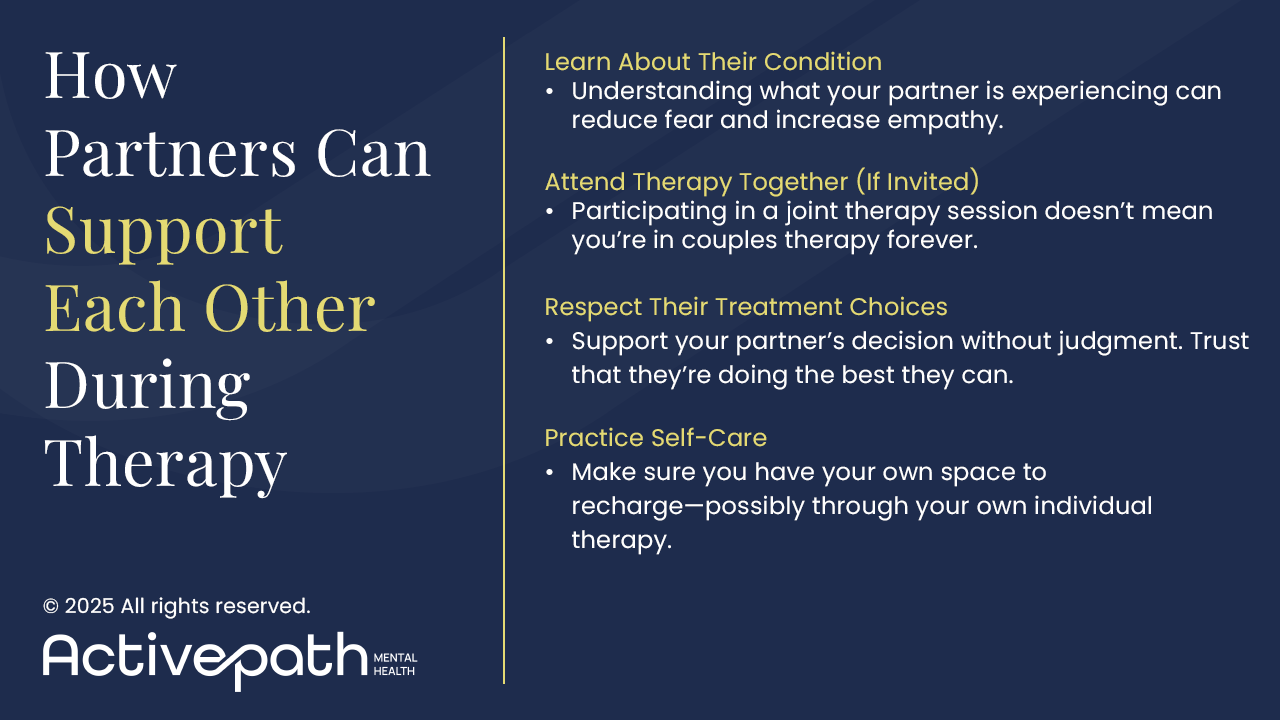When one partner is struggling with depression, anxiety, or other mental health conditions, it affects the relationship as a whole. Whether you’re the one experiencing symptoms or you’re walking alongside someone you love, mental health challenges can impact communication, connection, and even your shared future.
At Active Path Mental Health, we understand that supporting one partner means supporting both. That’s why we offer individual and relationship-focused mental health services in Salem and throughout the greater Portland region, including talk therapy, Transcranial Magnetic Stimulation (TMS), and medication management.
Our therapy sessions are led by a licensed therapist, ensuring you receive expert guidance tailored to your needs. Here, we explore how therapy can help partners better understand, support, and heal together, because no one should have to navigate this journey alone. If you and your partner are facing challenges, consider seeking couples counseling to strengthen your relationship and improve communication.
If your partner is struggling with depression or anxiety, we’re here to support you both—reach out to Active Path today or call 503.832.4861.
Why Partner Support Matters in Mental Health Care
Mental health struggles don’t exist in a vacuum—they ripple through families, marriages, and partnerships. For couples, untreated depression, anxiety, or trauma can lead to:
- Emotional disconnection
- Frequent conflict or miscommunication
- Feelings of guilt, helplessness, or resentment
- Breakdowns in intimacy and trust
- Isolation from shared goals and routines
The good news is that when both partners are actively engaged in the healing process, relationships often become stronger, more compassionate, and more resilient. Therapy provides a safe space to process challenges and learn how to better support one another by creating a supportive environment where couples can build trust and share vulnerabilities. In this supportive environment, therapy also plays a crucial role in addressing relationship issues, helping couples identify, explore, and resolve specific problems together.
Understanding Couples Therapy: More Than Just Conflict Resolution
Contrary to popular belief, couples therapy isn’t just for people on the brink of separation. Marriage counseling, while similar, is a specific form of therapy focused on married couples, whereas couples therapy is suitable for all couples regardless of marital status. In fact, it can be especially helpful when one or both partners are experiencing mental health symptoms, and the relationship is being impacted by:
- Mood swings or emotional withdrawal
- Chronic stress or burnout
- PTSD or past trauma
- Disordered eating or substance abuse
- Communication breakdowns during stressful life events
- Challenges with communication skills
At Active Path, we often work with couples where one partner is undergoing TMS treatment, adjusting to new medications, or navigating the ups and downs of anxiety or depression. Including the partner in therapy, either in joint sessions or as part of the support structure, can create a stronger foundation for long-term healing. Individual sessions may also be used to address sensitive issues, support personal disclosures, and set boundaries before returning to joint sessions.
After therapy, many couples notice improvements in emotional connection, trust, and conflict resolution. They also learn to communicate effectively, which is essential for understanding each other and resolving future challenges. Couples therapy can help with a wide range of relationship challenges, supporting couples in building healthier, more resilient partnerships.
Mental Health Therapy for Spouses: What Does It Look Like?
Couples therapy is flexible and tailored to the unique needs of the couple. At Active Path, our therapists may use:
- Emotionally Focused Therapy (EFT): Helps couples identify emotional patterns and respond to each other with empathy and understanding, while building emotional intimacy and strengthening their emotional connection.
- Cognitive Behavioral Therapy (CBT): Equips couples with tools to challenge unhelpful and negative thought patterns, identify relationship patterns, and improve communication.
- Trauma-informed therapy: Helps both partners explore how past experiences might be affecting present-day dynamics.
- Psychoeducation: Teaches partners about depression, anxiety, and how mental health symptoms can show up in relationships.
You don’t need a crisis to benefit from therapy. Often, couples report improvements in empathy, communication, and intimacy after just a few sessions. Regular therapy sessions and counseling sessions help couples develop better communication skills and effective communication skills, leading to stronger relationships.
4 Ways Partners Can Support Each Other During Therapy

If your partner is receiving treatment for a mental health condition, your support can make a powerful difference in their recovery journey. While supporting your partner, it’s also important to focus on managing conflict in a healthy way, as effectively handling disagreements can strengthen your relationship and emotional connection.
Here are ways you can help:
1. Learn About Their Condition
Understanding what your partner is experiencing, whether it’s depression, anxiety, or another condition, can reduce fear and increase empathy. Ask your provider at Active Path for resources or join an educational session.
2. Attend Therapy Together (If Invited)
Participating in a joint therapy session doesn’t mean you’re in couples therapy forever—it just shows you’re willing to engage, listen, and grow.
A skilled therapist can guide couples through these sessions, helping them resolve conflicts and strengthen their relationship.
3. Respect Their Treatment Choices
Whether your partner chooses TMS, medication, or talk therapy, support their decision without judgment. Trust that they’re doing the best they can.
4. Practice Self-Care
Supporting a partner with mental health needs can be emotionally demanding. Make sure you have your own space to recharge—possibly through your own individual therapy.
When One Partner Is Struggling and the Other Feels Alone
It’s common for the “supporting” partner to experience isolation, burnout, or emotional fatigue. In many relationships, the partner not undergoing treatment may feel:
- Overlooked by clinicians or caregivers
- Guilty for expressing their own needs
- Afraid of saying or doing the wrong thing
- Resentful or distant over time
Relationship distress can significantly impact both partners, making it important to address these challenges together.
That’s why our Salem-based care team prioritizes whole-family mental health. We often recommend that both partners receive individual therapy, in addition to any joint sessions, so everyone has a chance to process emotions, set boundaries, and feel supported. Individual sessions are valuable for processing personal emotions and establishing healthy boundaries, especially during times of relationship distress.
A licensed marriage and family therapist can facilitate support for couples by guiding discussions, helping both partners navigate relationship issues, and providing a safe space for healing. Family therapists are also equipped to support both partners during periods of relationship distress, ensuring that each person’s needs are addressed.
The Role of Therapy in Preventing Relationship Breakdown
When mental health goes unaddressed, relationships can deteriorate, even between two people who deeply love each other. Early intervention through therapy can prevent:
- Chronic resentment
- Emotional stonewalling
- Escalating conflict or detachment
- Separation or divorce due to untreated mental illness
- Ongoing relationship problems and unresolved relationship issues
By taking the brave step to seek support, together or individually, couples signal that their connection is worth preserving, even in the face of difficult circumstances. Therapy helps couples rebuild trust and resolve conflicts, which are essential for overcoming relationship problems and preventing further breakdown. The process of resolving conflicts and rebuilding trust is crucial to maintaining a healthy, lasting partnership.
Our Services in Salem: Local Support for Couples and Families
At Active Path Mental Health, we proudly serve couples and families in Salem and surrounding communities. Whether you’re seeking relationship counseling, support for your spouse’s mental health journey, or treatment for your own symptoms, we’re here to help.
Our services include:
- Talk therapy for individuals and couples
- Online therapy as an accessible option for couples and individuals
- Medication management with a collaborative, compassionate approach
- TMS therapy for treatment-resistant depression
- Support for LGBTQIA+ couples and nontraditional families of all sexual orientations
- Trauma-informed and culturally competent care
Our team consists of licensed marriage and family therapists, licensed marriage therapists, and other licensed therapists, all qualified to provide specialized relationship therapy. A marriage counselor or couples therapist can help you and your partner address relationship challenges, improve communication, and create a safe space for growth.
We support couples of all sexual orientations and backgrounds, ensuring therapy is affirming and inclusive. Our relationship therapy services focus on understanding and transforming relationship dynamics, helping you overcome common relationship challenges and build healthier connections.
We believe that mental wellness is a shared journey, and that healing happens best when no one is left behind.
When to Seek Help as a Couple
It might be time to consider couples therapy or partner-focused support if:
- You feel like you’re walking on eggshells
- You’ve stopped communicating openly
- One of you is experiencing a mental health crisis
- You want to prevent long-term relationship damage
- You love each other, but something feels off
- You are navigating major life transitions, such as moving, career changes, or starting a family
There is no shame in seeking help. In fact, the strongest couples are often those who ask for support early and often. The goal of therapy is to help you build a fulfilling relationship, a satisfying partnership, and a lasting relationship that brings you joy. Therapy can enhance communication, improve relationship satisfaction, and support healthy relationships in both romantic relationships and adult relationships.
You’re Not Alone—Healing Is Possible, Together
At Active Path, we know that strong partnerships are built not on perfection, but on connection, communication, and care. Through therapy, couples can develop empathy, strengthen emotional bonds, and create shared meaning, which are essential for lasting relationship satisfaction. The therapy process provides a structured path forward for couples, especially those facing mental health concerns, by fostering a safe environment to achieve a deeper understanding of each other’s perspectives. Whether you’re the one struggling or the one supporting, your relationship matters—and we’re here to help you protect it.
Ready to take the next step? Contact Active Path today or call 503.832.4861 to learn more about couples therapy, support for spouses, or personalized treatment plans for depression and anxiety.




